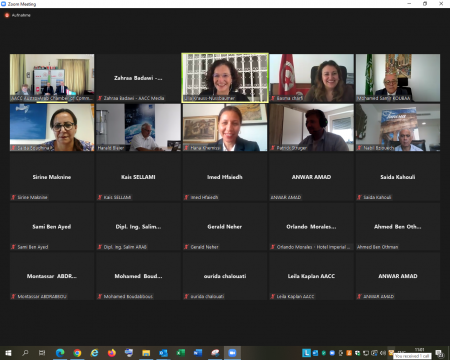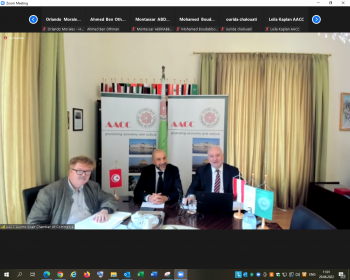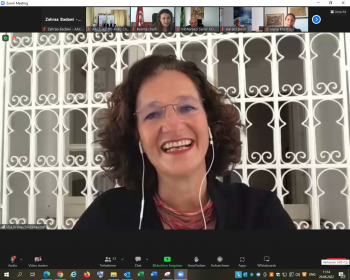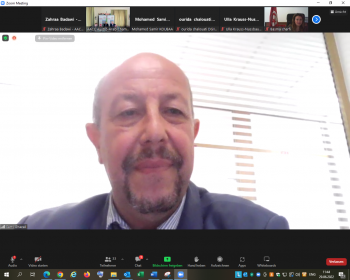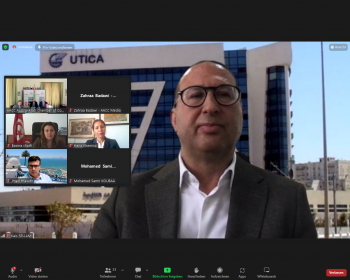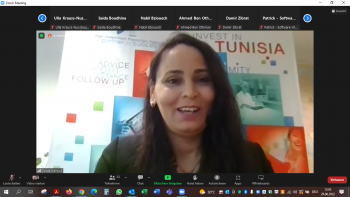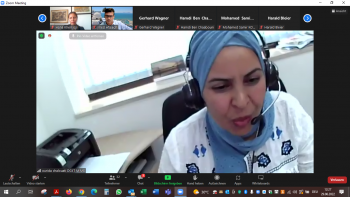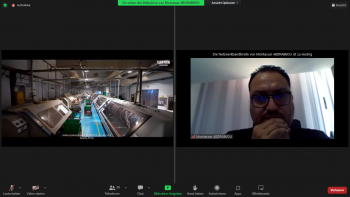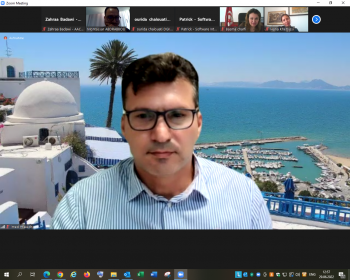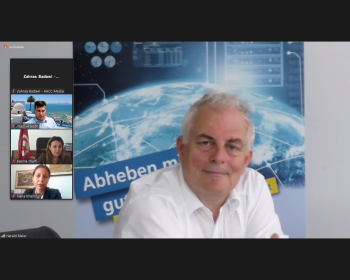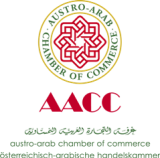On 29 June 2022, the Virtual Economic Forum "Tunisia & Austria - Promoting Business and Investment Cooperation in High Value Activities in the Electrical, Electronic and IT sectors” took place online, organised by the distinguished Embassy of the Republic of Tunisia in Vienna and the Austro-Arab Chamber of Commerce (AACC), in cooperation with the Tunisian Foreign Investment Promotion Agency (FIPA Tunisia). AACC Secretary-General Eng. Mouddar Khouja commenced and moderated the forum, and welcoming remarks were delivered by H.E. Mr. Mohamed Mezghani, Ambassador of the Republic of Tunisia to Austria, and H.E. Ms. Ulla Krauss-Nussbaumer, Ambassador of the Republic of Austria to Tunisia.
From left to right: Mr. Franz Bachleitner, H.E. Ambassador Mezghani & Eng. Mouddar Khouja
This webinar was marked by the participation of Mr. Franz Bachleitner, Commercial Counsellor at the Foreign Trade Centre of the Austrian Federal Economic Chamber (WKO / ADVANTAGE AUSTRIA) in Algiers, and Ms. Saida Kahouli, Managing Director of FIPA Tunisia - Germany Office. Featuring high-level officials from various Tunisian ministries (communication technologies and digital economy, industry, etc…) and senior representatives of Tunisian institutions, this webinar provided an opportunity to inform institutions and companies from Austria and neighbouring countries about the business environment in Tunisia and the multitude of business, investment cooperation and economic partnerships the country offers, namely in the electrical, electronic and IT sectors.
Eng. Khouja provided a historical anecdote of Tunisia, going back to the Phoenician era associated with trade, and reflecting on not only the past but also the present. As such, Khouja noted Tunisia’s 2nd rank in the number of graduates in science and engineering worldwide with a pool of 65,000 graduates per year, 3rd most innovative economy in Africa, and its rank among the top 5 African tech ecosystems of the future for 2021/22 in terms of cost effectiveness and human capital. Khouja also referred to a report recently published by the United Nations Economic and Social Commission for West Asia (ESCWA) on the Arab region, which highlighted Tunisia’s launch of its National Strategy for Artificial Intelligence (AI).
H.E. Ambassador Mezghani highlighted the political and economic relations between Austria and Tunisia, noting Austria’s early support for more comprehensive and co-profitable partnerships on both the bilateral and regional multilateral levels (Tunisia-EU). He also emphasised the shared political will to induce new dynamics, to involve the public and private sectors and to identify investment and business opportunities from both countries. Ambassador Mezghani called for further exploring the potential of the Austrian-Tunisian “win-win cooperation” while focusing on high-added value sectors, such as the electric, electronic and IT sectors, in addition to renewable energy, green industries, organic agriculture and waste management.
H.E. Ambassador Ulla Krauss-Nussbaumer
H.E. Ms. Ulla Krauss-Nussbaumer commended the organisation of this webinar and welcomed the common economic interests between Tunisia and Austria, two countries that are not only geographically close, but also share the savoire vivre. Currently, 50 Austrian enterprises are active in Tunisia, including big renowned companies such as the Austrian Multinational Gas, Oil and Petrochemicals Company (OMV) and GIS Aqua, a company providing sustainable environment-friendly solutions in waste water treatment, drinking water treatment and desalination. Ambassador Nussbaumer reiterated the multitude of investment and cooperation opportunities Tunisia offers in the previously mentioned sectors, while drawing attention to the need for administrative/public sector reform which is already in progress. While EU investors constitute 85% of foreign investments in Tunisia, Nussbaumer encouraged more Austrian-Tunisian partnerships and assured of the readiness of the Austrian Embassy in Tunis to assist at any stage in this regard.
Mr. Franz Bachleitner stated that the recent war in Ukraine has been severely interrupting relations and businesses yet invited to explore North Africa as a hub. As such, he praised Tunisian business partners and Austrian investors who have always shown keen interest in doing business with each other, and he praised the activity of big Austrian companies in North Africa and particularly Tunisia, which he referred to as a “positively- growing avalanche”. Austro-Tunisian ties date back to decades ago, starting with the Vorarlberg textile industry and later on OMV which has been present in Tunisia since 1972 and constitutes Tunisia’s biggest European investor (> € 1 billion Euro investment). Last year, Tunisian electric and electronic exports to Austria reached approx. € 48 million, which manifests how the European automotive sector has been using Tunisia as an industrial hub and a supply chain. Bachleitner urged the Tunisian government to create a framework of political, financial and economic stability to further attract investors.
Mr. Sami Ghazali
Mr. Sami Ghazali, Head of Digital Economy Unit at the Tunisian Ministry of Communication Technologies and Digital Economy, presented Tunisia’s national digital strategy aimed at achieving a set of objectives pertaining to investment, jobs and technological positioning, as well as improving digital and financial inclusion and Tunisia’s ranking in the Global Innovation Index by 2025. This vision seeks to place digital technology at the heart of the country’s economic and social development, by means of achieving an array of priorities, including but not limited to the following: providing access to broadband connection, digital and financial services and thus combating digital illiteracy, developing an ecosystem of startups and innovation that serves to attract local and foreign investment, digitalisation of the administration, adaptation of training and development policy in line with the needs of the digital sector, in addition to implementing a cybersecurity and data protection strategy. Moreover, Mr. Ghazali noted that Tunisia has around 10,000 ICT new graduate per year (engineers, technicians and software developers).
Mr. Kais Sellami
Mr. Kais Sellami, President of the Tunisian Digital Federation, Tunisian Confederation of Industry, Trade and Handicrafts (UTICA), presented the private digital sector in Tunisia which UTICA represents, with its 2 main objectives being defending the interests and the development of the private sector as well as promoting and developing this sector nationally, regionally and internationally. Sellami elaborated on the 2 main charecteristics that render Tunisia competitive and appealing in comparison to other neighbouring countries, which are its ICT resources and skills and the country’s ICT ecosystem. In this context, Sellami suggested to Austrian companies investing in Tunisia to establish their own skills, development, or expertise centres using Tunisian resources and ICT graduates pool, and he highlighted the “Digital Talent” programme launched by UTICA 3 years ago, which aims to deliver the right persons according to the needs of and the gaps in the market worldwide. Sellami also stressed the importance of the digital sector which has always been viewed as a strategic sector by Tunisian governments, even more so recently as manifested by reforms and laws, such as the “Startups Act Law” and data protection laws, rendering the ICT sector the catalyst for public-private dialogue and common strategy.
Ms. Saida Kahouli
Ms. Saida Kahouli, Managing Director of Invest in Tunisia Agency (FIPA Tunisia) - Germany Office, delivered a presentation on business and investment opportunities in Tunisia, focusing on key figures of the foreign direct investment (FDI) landscape in Tunisia, major assets and business opportunities in the country, and the mission of FIPA Tunisia. Tunisia is home to more than 3,700 foreign company, of which 21 are Austrian, mainly operating in high-value sectors. In the past 2 years, annual foreign investment operations exceeded 500 and created close to 10,000 jobs. Tunisia’s geostrategic Mediterranean location and already-established and underway free trade, investment and double taxation agreements with neighbouring countries and regional entities make it a gateway to Europe and sub-Saharan Africa.
Ms. Kahouli pointed out the competitive costs of software development engineers and R&D team leaders in Tunisia compared to neighbouring and EU countries and the fact that Tunisia ranked 1st in Africa for the quality of ICT infrastructure according to Bloomberg’s Innovation Index for 2020. Kahouli elaborated on the friendly business environment, incentives and facilitations the country offers and provided key figures on the mechanical, electrical and electronic industries in Tunisia, the country’s 1st exporting sector. Tunisia is the 7th supplier of electrical machinery to the EU and ranks 3rd in the production of automotive parts in Africa. Finally, Ms. Kahouli reiterated FIPA’s readiness to assist interested parties by providing information, helping with initiating contact, and any form of assistance needed.
Ms. Ourida Chalouati
Ms. Ourida Chalouati, representing Ms. Nada Lachaal, Director-General of the Department of Industrial and Technological Infrastructure at the Tunisian Ministry of Industry, Mines and Energy, delivered a presentation on the high value-added industries in Tunisia and the country’s Industrial & Innovation Strategy 2035, which aims at long-term objectives of inclusive growth, ensuring social-economic and territorial cohesion. Ms. Chalouti focused on the strategy’s framework and challenges, the structure of the Tunisian industrial sector, and gave an overview of the strategy and action plan and its implementation.
This strategy strives to boost economic growth with the aim of improving the standard of living of the Tunisian population, increasing employment and reducing the development gap among Tunisian regions. It also aspires to improve the competitiveness of companies based on innovation and technology, as well as develop their presence in foreign markets, while moving towards a clean environmental economy based on renewable energy sources. Ms. Chalouati highlighted some of the promising industrial sectors and services, such as the electrical, electronic, mechanical, metallurgical, construction, clothing and textile, food, chemical and pharmaceutical sectors, and of course ICT, technical and engineering services.
Mr. Montasser Abdrabbou
Mr. Montasser Abdrabbou, Financial Director and Representative of Elentica-Electronic Cluster presented the Cluster, which was officially launched in 2017 with the mission of bringing together electronics players and users, creating an electronics lobby and boosting business in this sector. The Cluster currently encompasses 45 members with a turnover of €1.2 billion and employs more than 15,000 persons in Tunisia, of which 66% are females. More particularly, the Cluster includes over 3,000 engineers from different fields, such as research and development (R&D), electronics, mechanics and IT. Moreover, it brings more than 40 industrial companies with educational institutions and research laboratories where waterproofing and frequency testing among other kinds of product testing are conducted to attain high reliability and best quality standards. Elentica is in fact well-known and appreciated for its competencies around PCB testing, ICT and FCT.
Mr. Imed Hfaiedh
Mr. Imed Hfaiedh, Head of Market Research Department at the Tunisian Export Promotion Centre (CEPEX), delivered a presentation on behalf of CEO Mr. Mourad Ben Hassine on the “Tunisian-Austrian economic cooperation and business opportunities”, where he introduced and provided an overview of the Tunisian mechanical, electrical and electronic industries (MEEI), bilateral trade & business opportunities. Established in April 1973, CEPEX is a state-owned institution operating under the Tunisian Ministry of Commerce with the objective of promoting the expansion of Tunisia’s exports and increasing international visibility of Tunisia’s export potential. A such, CEPEX’s core activities revolve around promoting these objectives and providing information and assistance to potential investors and businesspersons.
In 2021, MEEI constituted 46% of Tunisia’s exports estimated at €6,9 billion, and the total bilateral trade between Austria and Tunisia grew by 3,9% to reach €172, whereby Tunisia’s imports from Austria increased by 18,5% and its exports to Austria decreased by 8,5%, its main exported products to Austria being automotive wiring sets and electrical cable. In light of Tunisia’s bilateral and multilateral free trade agreements, it's free access to over 70 markets and its recent accession to the Common Market for Eastern and Southern Africa (COMESA), Hfaiedh encouraged Austrian counterparts to consider Tunisia as a hub and gateway to Africa, by investing, co-producing or sub-contracting in Tunisia.
Eng. Harald Bleier, Technology Evangelist at Ecoplus / Niederösterreichs Wirtschaftsagentur GmbH, delivered a company testimonial, where he elaborated on his experience in Tunisia via an EU cluster mentorship project, during which he learned a lot about Tunisia, namely the power of engineering and industry the country enjoys. Mr. Bleier clarified the role of clusters in increasing innovation dynamics by cooperating with universities and research centres to transform knowledge into value within companies, a process that this cluster project seeks to transfer for implementation in the mechatronics sector in Tunisia. He also encouraged more partnerships between Austrian and Tunisian counterparts.
To conclude, AACC Secretary-General Eng. Mouddar Khouja thanked the distinguished Embassy of the Republic of Tunisia in Vienna and FIPA Tunisia for their cooperation on this virtual economic forum, as well as AACC staff who worked hard to plan and implement this workshop and the distinguished speakers and participants who joined virtually from all over the globe.
Categories: Reports

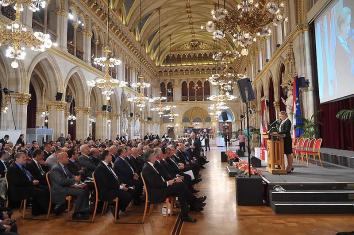
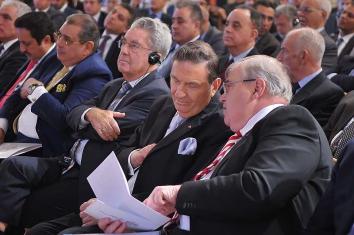





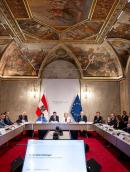








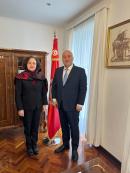









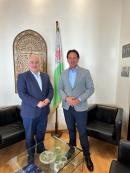

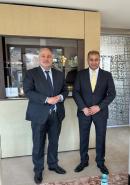

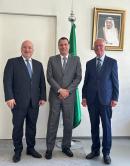
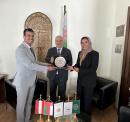


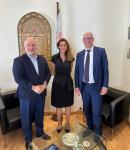
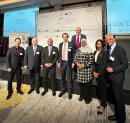
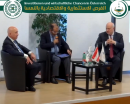




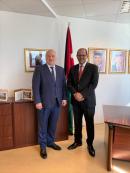
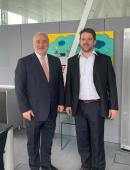
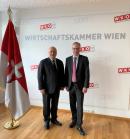

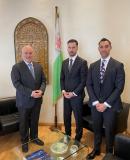

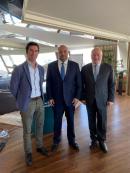
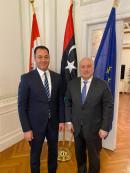





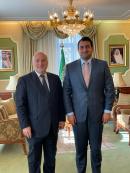
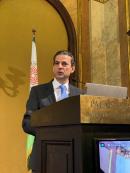
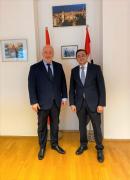
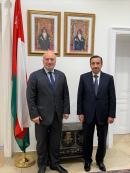



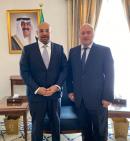
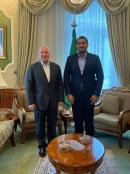
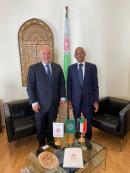
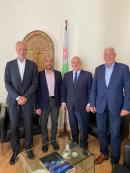








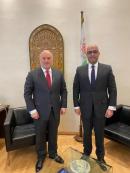

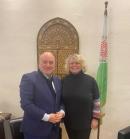


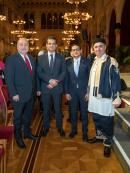

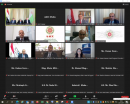



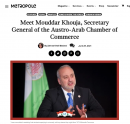



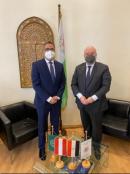


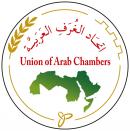


 Go to blog
Go to blog 